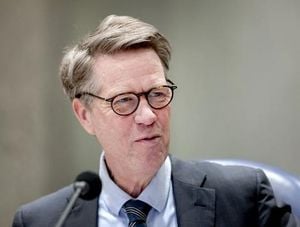In a significant turn of events, former Andhra Pradesh intelligence chief PSR Anjaneyulu was arrested on April 22, 2025, in Hyderabad, amid allegations surrounding the wrongful arrest and harassment of Mumbai-based actor Kadambari Jethwani. This arrest follows a series of investigations into the actions of Anjaneyulu and two other senior officers during the previous YSR Congress Party (YSRCP) administration.
PSR Anjaneyulu, who held the rank of Director General of Police (DGP) and served as the state intelligence chief, was taken into custody by the Andhra Pradesh Crime Investigation Department (CID) from his residence in Hyderabad. The CID is currently probing the circumstances surrounding Jethwani's arrest, which has been characterized by allegations of procedural violations and political interference.
The controversy dates back to February 2024 when Jethwani was arrested following a complaint by Kukkala Vidyasagar, a film producer and YSRCP leader, who accused her of defrauding him in a property deal. According to Jethwani, the police acted hastily, arresting her and her elderly parents without proper legal procedures. They were reportedly held for over 40 days in judicial custody before being granted bail.
Jethwani's legal troubles began when she filed a complaint in August 2024, alleging that Anjaneyulu and two other IPS officers, former Vijayawada police commissioner Kanthi Rana Tata and former deputy commissioner Vishal Gunni, had conspired to wrongfully detain her. The complaint detailed how the officers allegedly colluded with Vidyasagar, acting on his accusations without a formal investigation or adequate evidence.
According to the investigation, Anjaneyulu had issued oral orders for Jethwani's arrest on January 30, 2024, a day before an FIR was officially registered against her. The officers reportedly booked tickets to Mumbai to apprehend Jethwani and her family, indicating premeditated actions that bypassed standard legal protocols. The FIR against Jethwani was only filed on February 2, 2024, after the arrest had already taken place.
Upon her release, Jethwani alleged that she and her family were subjected to mental torture during their time in custody. She claimed that the police threatened her with dire consequences if she did not withdraw a separate case she had filed against a corporate executive in Mumbai. This executive, linked to a steel plant project in Andhra Pradesh, was said to have connections with the political leadership at the time.
In response to Jethwani's allegations, the Andhra Pradesh Police chief ordered a probe, leading to the suspension of Anjaneyulu, Tata, and Gunni under Rule 3(1) of the All India Services (Discipline and Appeal) Rules, 1969. Their suspension was based on findings that indicated misconduct and dereliction of duty in handling Jethwani's case.
The YSR Congress Party has characterized Anjaneyulu's arrest as a politically motivated act, part of a broader campaign against officers who served under the previous administration. In a statement, the party described the move as an alarming misuse of state power, asserting that it reflects ongoing political vendetta against serving IPS officers.
Former YSRCP minister Ambati Rambabu defended Anjaneyulu, highlighting his past achievements in combating rowdyism in cities like Guntur. Rambabu claimed that the arrest was an attempt to distract the public from the current government's issues, including questionable land allotments to dubious firms. He criticized the new regime for targeting officers who were previously aligned with the YSRCP.
As the investigation continues, Anjaneyulu is expected to be presented in court in Vijayawada. The implications of this case extend beyond personal accountability, raising questions about the integrity of law enforcement in Andhra Pradesh and the potential for political influence to disrupt judicial processes.
In the backdrop of these events, the case of Kadambari Jethwani serves as a stark reminder of the complex interplay between politics and law enforcement in India. It underscores the need for transparent investigations and the protection of individual rights against arbitrary state actions. The unfolding narrative will be closely watched as it may set precedents for how similar cases are handled in the future.










